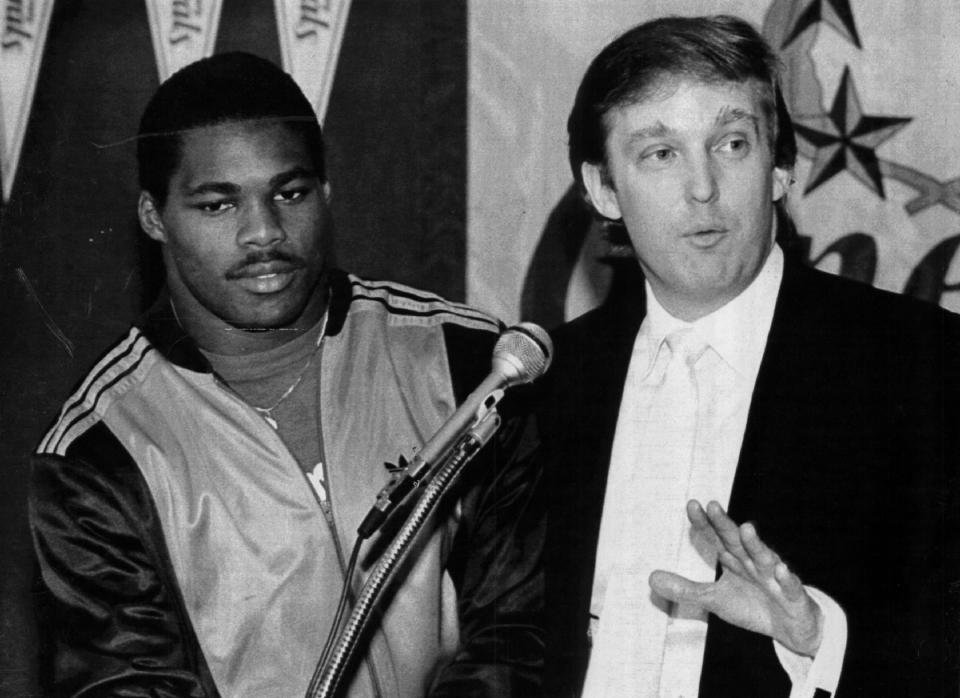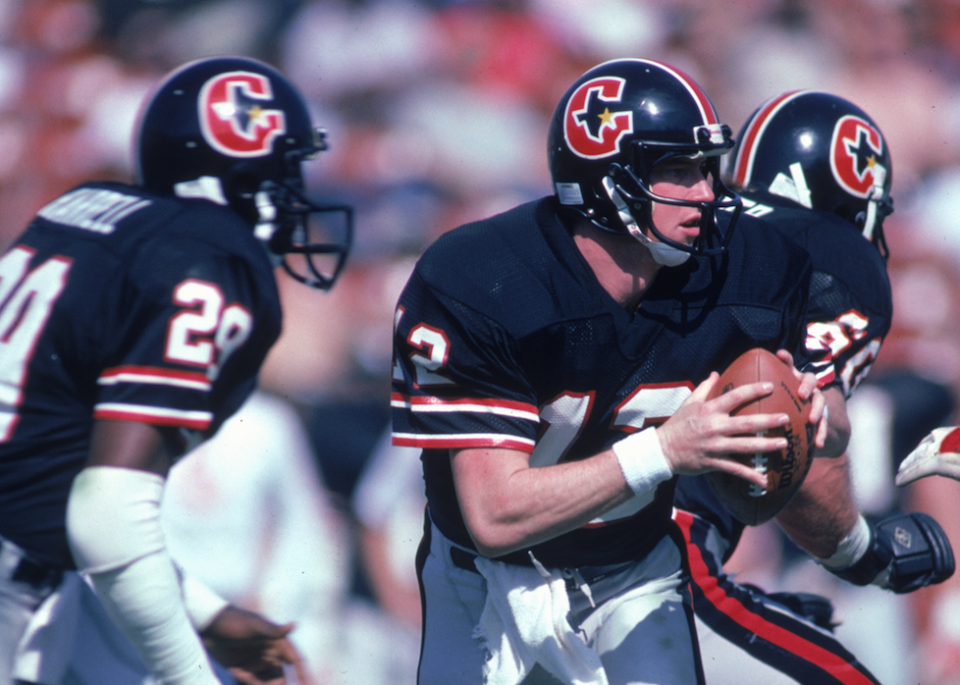New book: How Donald Trump cajoled the USFL into obliterating itself

Jeff Pearlman’s “Football For A Buck: The Crazy Rise and Crazier Demise of the USFL,” is a wonderful, thorough, insightful look at a deeply weird moment in American football history. And it’s also a primer of sorts for this current deeply weird moment in American political history. Which means that there are two stories: one about a spring football league that had dreams of challenging the NFL, and one about the team owner who sent the entire league pinwheeling into oblivion … and then went on to become president of the United States.
For anyone born after, oh, 1978 or so, the USFL is an abstraction, a two-line toss-off in the Wikipedia entries of Steve Young, Jim Kelly, Herschel Walker, Reggie White, Doug Flutie and other 1980s football heroes. But for anyone who remembers its brief, odd existence, it was so, so much more. Its premise was simple: pro football, but in the spring. Pearlman nails the league’s entire story, from on-field absurdity to boardroom misfires, and shows just how much damage one idea, pushed relentlessly, can do to an entire enterprise.
In its three seasons of existence, the USFL attracted a cavalcade of castoffs, has-beens, and never-wases before going all in on big names like Young and Walker. A rocket held together with duct tape, it flared brightly and then vanished. And the strangest thing of all is, were it not for Donald Trump – and the team owners who went along with him, many against their better instincts – it might well have worked.
The strange story of a little league that almost could
The USFL’s story didn’t begin with Trump, but it certainly ended with him. Begun in 1982 with a dozen teams and a strange array of owners – some who were wealthy, some who were charlatans, and some who were flat-out insane – the league found a foothold as sort of an anti-NFL, a league that encouraged recklessness and fun while the NFL remained mired in stodgy solemnity. The two-point conversion and the coach’s challenge came from the USFL, and so did the ability of players to jump from college to the professional ranks before graduation.
Drawing on more than 400 interviews, Pearlman recounts in substantial and hysterical detail how coaches cobbled together teams of journeymen and lunatics, players who would shoot up, smoke up, or, uh, consort with female fans within minutes of game time. The USFL didn’t offer first-class accommodations – players were often forced to play on ragged fields and before crowds in the low four figures – but what it did offer was a chance to play more football, and for many willing players, that chance was enough.
The USFL trundled through its first season, 1983, with only modest on-field success, but with a seismic blast: the arrival of Herschel Walker, the tanklike running back who jumped from the University of Georgia to the USFL a year before the NFL could grab him. The crew of misfits that the NFL initially wrote off as “Useless” was a legitimate football power player. And when the league later snapped up two more Heisman winners in Mike Rozier and Doug Flutie, suddenly nobody in the NFL was laughing at all.

Donald Trump takes control
But by this time, Trump had entered the picture. And Pearlman doesn’t need to point out the parallels between Trump’s time in the USFL and our current era; they’re all right there in black and white.
As the USFL formed, Trump was a hot New York City real estate developer in his mid-30s whose reputation hadn’t yet crossed the Hudson River. He jumped on the USFL, taking ownership of the New Jersey Generals, when the train was already rolling, and immediately set about savaging the entire USFL operation. He railed at the incompetence of the USFL’s commissioner and the small-minded thinking of his fellow owners, and he threw around big numbers and talked big dreams. Trump tried to sign Lawrence Taylor away from the Giants, and succeeded in signing Flutie, albeit with a pay-for-that-wall-style request of his fellow owners: kick in on Flutie’s salary “for the good of the league.”
The other owners laughed off that request. But they weren’t laughing at everything Trump did. All along, he had in mind an ulterior motive.
“Beginning shortly after he purchased the Generals,” Pearlman writes, “Trump made it his objective to force the USFL’s hand and convince his peers — often against their own best interests — to switch directions and switch seasons.”
Yes, switch seasons. Move the USFL from the calm waters of the spring – where no football competition existed – into the raging hellstorm of the fall, where it would compete with the NFL, college football, and Friday night lights. Not only that, with Trump’s cajoling, the USFL actually sued the NFL for antitrust violations, claiming the league held an unlawful monopoly on professional football.
From an organizational perspective, it was insane. But from Trump’s perspective, it was an audacious, big-thinking gamble. Trump wanted into the NFL in the worst way, even given – or perhaps because of – the fact that the league’s owners rejected him time and time again on both competency and financial-solvency grounds. And with the USFL, his plan was this: move the league to the fall, move the Generals into a planned Trump Stadium in Manhattan, and then leap into the NFL through an AFL-like merger. If the other owners could join him, good for them. If not, well … too bad, so sad.
“[NFL] ownership is the most elusive club in the world,” Pearlman told Yahoo Sports. “It’s not even about football for him. Never was. It’s the eternal, sort of sad need to be what he can’t possibly be. A Mara. A Rooney. Big and dignified and elite. He doesn’t merely crave wealth. He craves the status, the esteem that comes with being something on a pedestal. NFL ownership was that very thing.” (The roots of Trump’s current war with the NFL stretch back to long before Colin Kaepernick was even born.)
Trump, through sheer force of will, hectored the USFL’s other owners into agreeing to move to the fall after the 1985 season – instantly vaporizing four teams who had been sharing stadiums and fans with their larger, more established NFL counterparts. (This is important to note: Trump didn’t do this all himself. He had help from other owners, who rolled over and went along, assuming that Trump had their best interests at heart … or, at the very least, that they’d get rich.) Other teams, facing huge losses thanks to overexpansion, soon faltered and faded away. Trump, aided by Cold War-era attorney Roy Cohn, pressed on with his courtroom attack against the NFL. But when the USFL finally “won” its antitrust lawsuit – receiving only the nominal sum of $1, hence the book’s title – the league, which had been banking on a huge settlement to underwrite its move to the fall, vanished into history.
Pearlman’s book is an outstanding achievement. You can read it, if you wish, as a precursor to Trump’s presidency; certainly there are enough parallels – like making others crumble under the weight of constant barrages of withering, fact-challenged criticism – to keep D.C. political writers thumbing through this book for material for a year.
But the book isn’t just about Trump. It’s about a truly strange league – a league where a player once punched his coach after being cut, a league where a player once slammed his own penis in a car trunk – and the kind of maverick oddity that doesn’t exist in American sports any longer.
Read “Football for a Buck,” and then see if you’re not scouring the web to find some vintage Memphis Showboats or Tampa Bay Bandits gear.
Subscribe to The Yahoo Sports NFL Podcast
Apple Podcasts• Stitcher • Google Podcasts
More from Yahoo Sports:
• Dez apparently caught using burner account
• Mexico’s offensive chant just won’t go away
• MLB Power Rankings: Astros have eyes on Red Sox
• Boxing legend considering White House run
____
Jay Busbee is a writer for Yahoo Sports. Contact him at jay.busbee@yahoo.com or find him on Twitter or on Facebook.


